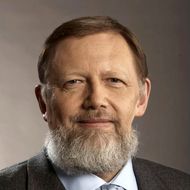Fragmentation and Bloc Formation: How the Global Economy is Changing

Sergey Dubinin, former head of the Bank of Russia and Professor of Finance and Credit at the Faculty of Economics at Moscow State University, has delivered an honorary address at the XXV Yasin (April) International Academic Conference. He spoke about the transformation of the global monetary and financial system, as well as the Russian economy.
As Sergey Dubinin pointed out, one of the key trends that has become evident since the pandemic and which remains relevant today is the fragmentation of the global economy. ‘This fragmentation represents a certain stage of globalisation. At first, it was interpreted as deglobalisation, a complete breakdown, but it soon became clear that the situation is not quite like that,’ he noted. Fragmentation is contributing to a slowdown in international trade, the growth of barriers to the movement of goods, services, and labour, as well as restrictions on the spread of technology. These trends are causing concern among many experts.

Sergei Dubinin
This fragmentation is particularly evident in relations between countries. Blocs are being formed that are aligned with either the USA or China. There are also so-called neutral states, intermediary countries such as India or Mexico. ‘They want to act as intermediaries in both trade and financial operations,’ said Sergey Dubinin. ‘Economic relations are developing more actively within blocs. Trade and capital flows between blocs are facing restrictions, particularly in the form of tariffs,’ he explained. Moreover, the recent announcement by US President Donald Trump regarding increased tariffs is seen as a development that reinforces these trends, the expert added.
Against the backdrop of ongoing shifts in the global economy, confidence in American securities has declined. ‘They used to be seen as a safe haven,’ said Sergey Dubinin. ‘That was the advantage of the American financial market—even during a crisis originating in the US, US government securities were considered the safest investment. And huge sums of money were directed there.’ In recent years, however, there has been a noticeable drop in investment in these instruments.
‘We are currently witnessing a heated phase in US–China relations. This could lead to various consequences in both the political and economic spheres,’ the expert remarked. It is therefore important to determine what position Russia intends to take. ‘Lately, we have been hearing a great deal about joint Russian–American economic projects,’ said Sergey Dubinin. One viewpoint is that it would be better for Russia to assume the role of an intermediary country, rather than orienting itself unilaterally towards one side.
The former head of the Central Bank also spoke about the state of the Russian financial sector. He noted that despite numerous sanctions, the position of banks remains stable. In 2024, the net profit of banks exceeded 4 trillion roubles. According to him, there are currently just over 300 credit institutions operating in the market, with only 35 showing losses. He reminded the audience that ‘between 2010 and 2020, a total of 681 banks were closed.’
As a result, according to Sergey Dubinin, a ‘highly concentrated and fairly stable’ system has now emerged. The top ten largest Russian banks, which include systemically important institutions, account for nearly 80% of the banking system’s assets. At the same time, ‘key quality indicators remain quite strong.’
See also:
Applications to Participate in April International Academic Conference Now Open
HSE University is now accepting proposals to present academic reports at the XXVI April International Academic Conference named after Evgeny Yasin. Applications can be submitted until December 16, 2025. The conference events will take place mainly on-site in Moscow from April 14 to 17, 2026.
24 Countries Represented at 25th Yasin International Academic Conference Held by HSE University
The Programme Committee of the 25th Yasin (April) International Academic Conference on Economic and Social Development has summed up the initial results. In 2025, 1,384 people from 24 countries and 29 Russian regions participated in the conference, with 335 of them delivering presentations.
Stuck in the Net: How Much Time Children Spend Online
On average, a schoolchild spends 48 hours a week on studies—equivalent to a six-day working week for an adult. This was highlighted by experts at the round table ‘Domains of Children’s Well-Being Evaluation for Human Potential and Evidence-Based Social Policy Development,’ held as part of the 25th Yasin (April) International Academic Conference.
Russian and Chinese Scholars Share Experience of Transformation of Doctoral Education
The Russian and Chinese postgraduate education systems originally borrowed their institutional frameworks from the Soviet Union. However, in the 21st century, they have evolved along different paths. While key performance indicators for postgraduate programmes in Russia are declining, China is seeing a rapid increase in the number of postgraduate students. These contrasting trajectories and the reforms undertaken in each country in recent decades were the focus of a roundtable discussion held as part of the 25th Yasin (April) International Academic Conference.
Nobel Laureate Proposes Solution to Markov Equilibrium Problem
In dynamic games, a Markov equilibrium involves strategies that guide players' behaviour based on the current state of the game, rather than its entire history. This approach is effective when players have access to complete information. But when uncertainty arises in the game—for instance, when players are unsure of who they are dealing with—this approach can become problematic. Eric Maskin, Nobel Laureate in Economics and Professor at Harvard University, addressed this issue in a paper presented at the XXV Yasin (April) International Academic Conference on Economic and Social Development held at HSE University from April 15 to 18, 2025.
‘The World Is Becoming More Complex and Less Predictable’: What Scientists Say about the Future
The future is now more difficult for researchers to forecast, and events that are hard to predict are playing an increasingly significant role. But there is good news too: scientists are confident that humanity will adapt to any changes. This was the focus of discussion at the International Symposium ‘Foresight in a Rapidly Changing World,’ which took place as part of the 25th Yasin (April) International Academic Conference.
More Children, More Happiness: HSE Experts Study Impact of Number of Children on Russians' Assessment of Happiness
Russians with children feel happier than those without children. At the same time, the number of children influences the assessment of happiness: the more children Russians have, the happier they feel. These conclusions were outlined inthe report ‘More Children, More Happiness: The Impact of the Number of Children on Russians’ Assessment of Happiness,’ presented at the XXV Yasin (April) International Academic Conference on Economic and Social Development, held on April 15–18 at HSE University. The study was conducted by Elena Churilova, Senior Research Fellow, and Dmitry Jdanov, Chief Research Fellowat HSE International Laboratory for Population and Health.
HSE Expands Cooperation with Gulf Countries
HSE University and the Centre for International Policy Research (Qatar) have agreed to collaborate in the field of social sciences, with plans for joint research, academic exchanges, and regular expert engagement. The agreement was signed during the roundtable ‘State Capacity and State Resilience in the Global South,’ held as part of the 25th Yasin (April) International Academic Conference at HSE University.
‘We Grow Old before We Become Rich’: How BRICS Countries Can Achieve Economic Growth
Due to population aging, many countries aiming for economic prosperity have limited time left to undergo economic transformation, according to the honorary report Narratives Versus Reality on Employment and Demography: How Undermining Institutions Can Push Countries Out of the ‘Narrow Corridor’ by Santosh Mehrotra of the University of Bath. The report was presented at the XXV Yasin (April) International Academic Conference.
XXV Yasin (April) Academic Conference Kicks Off at HSE University
The anniversary 25th Yasin (April) International Academic Conference on Economic and Social Development will take place from April 15 to 18. This year, over a thousand applications were submitted to present at the conference, of which the Programme Committee selected 381 of the best research papers in their respective fields.


